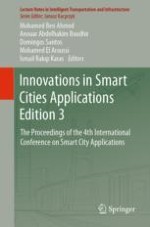2020 | OriginalPaper | Chapter
Towards Recommendation Using Learners’ Interest in Social Learning Environment
Authors : Mahnane Lamia, Mohamed Hafidi, Samira Aouidi
Published in: Innovations in Smart Cities Applications Edition 3
Publisher: Springer International Publishing
Activate our intelligent search to find suitable subject content or patents.
Select sections of text to find matching patents with Artificial Intelligence. powered by
Select sections of text to find additional relevant content using AI-assisted search. powered by
